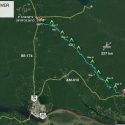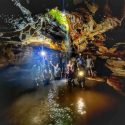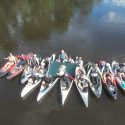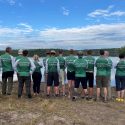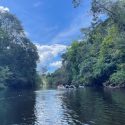Ex NORTHERN AMAZONAS FORTUNE was a 4th Battalion The Royal Yorkshire Regiment Kayaking / Canoeing expedition to the Rio Urubu, Amazonas District, Brazil, 23 June – 08 July 2023. A physically and mentally demanding expedition, conducted in one of the most bio-diverse and challenging environments on Earth, where 13 novices and 2 instructors completed an arduous 227km paddle of the Rio Urubu (a tributary of the Great Amazon River) whilst remaining self-sufficient for 10 days ‘on river’ through uninhabited regions of the Amazon rainforest.
2Lt Hernaman shares his experience:
“As we gathered on a warm Friday morning at Worsley Barracks in York, numerous questions were going through our minds – had I packed the right kit? How hot would it really be? But one thing was clear – we all knew that it was an opportunity of a lifetime. This was my first Adventurous Training course, my first visit to the jungle, and I had also only been on a kayak/canoe for a few hours – so I was apprehensive to say the least.
Around 27 hours and 3 flights later we landed in Manaus, and a warm welcome from our main guide Erikes was waiting for us. The severity of the heat/humidity became apparent immediately. We spent the rest of the day making our final preparations and transferring our kit to the many dry bags that would be used on the river. We set off by minibus early the next day and headed north on the road which eventually led to Venezuela. The trees and trucks got larger, and the road bumpier. After a short delay (caused by a blown out tyre – we hoped this wasn’t a sign of things to come), we arrived at the drop off point as the temperature hit 34 degrees. We met the team of locals that would be our guides for the next 10 days and loaded our kit onto the 11 Sit On Top Kayaks and 2-person canoes.
We set off slowly, but not before a swim to ease our fears of the river itself. After a few hours paddling, which included two capsizes and one lost phone, we arrived at camp 1. Our guides had prepared a late lunch of rice, bean stew and barbecued piranha (along with some wild chillies which I avoided). We set up camp deep in the jungle, grateful to be out of the sun, hesitantly setting up our hammocks for the first time as the light dropped. This was my first experience of the jungle – the humidity, heat, sounds, insects, vegetation combined to create an awesome atmosphere.
A restless night’s sleep, interrupted by howler monkeys and falling trees, was quickly forgotten by all as we were treated to a traditional Brazilian breakfast. We then headed further into the jungle in search of a cave, home to dozens of bats (one of the highlights of the trip), and a nearby waterfall and pool (vine rope swing included). Even early in the morning, and only trekking a short distance, the heat and humidity became formidable. We loaded up the kit and headed back onto the river. The lunch stop gave us the opportunity to visit another incredible waterfall and cool off. Along the way we came across a tarantula; It seemed huge to us but we were told afterwards it was actually quite a small one. We paddled for another few hours to the next camp location – trying to keep cool and stay hydrated was a constant struggle on the river, with no cover from the sun. Camp 2 was an abandoned riverside lodge, which provided an empty structure for us to hang our hammocks. We made the most of the daylight by bathing and cleaning our clothes in the river – we had already started to smell… Sweat, rain and regularly being in and out of the river meant we were always wet, although it made wet/dry drills and good admin all the more important.
Over the next 7 days we spent more and more time on the river each day (paddling up to 35 km), all the while gaining open boating technical skills and knowledge as part of the Open Canoe Foundation (O2F) qualification. We settled into a rhythm and our confidence grew, allowing us to appreciate the beautiful forest and the wildlife and the hard seats of the boats and incessant insects were soon ignored. The same routine was followed each day and we became very efficient at setting up and collapsing camp. Particular highlights of mine were seeing a pair of monkeys in the trees on the river bank as we were paddling on day 4, piranha fishing at night, witnessing a thunderstorm that hit our camp at 1am on day 7, and seeing rare pink river dolphins (on multiple occasions). The river and landscape changed as we headed downstream, the fast-flowing narrow river become slow and open, with no defined banks – only half submerged trees. This made navigation difficult and reduced our average speed.
Our last day on the river arrived sooner than we wanted, however I can admit that 10 days of paddlin and the jungle had taken its toll on all. A particularly hot day, we arrived exhausted at the finish point – glad to have all completed the expedition with no (major) injuries. The air-conditioned minibus was very welcome and after some goodbyes we headed back to Manaus. Our attention now turned to sorting our kit out, and the next two days. We headed to a nearby Ecopark where we went Caiman spotting, trekked through the jungle, learnt about the indigenous people’s traditional methods of farming, volunteered at a monkey sanctuary helping with the feeding, and some of the group even swam with wild pink river dolphins.
It was a much-needed chance to unwind after the river phase, and a great opportunity to see even more of the unbelievable Amazon wildlife before we headed home. A physically challenging yet absolutely phenomenal experience that each one of us will never forget.”
The expedition was a resounding success, qualifying 10 personnel in Open Boat (O2F) and identifying 6 candidates to progress thorough the ATG system to become future instructors. A cohesive group throughout, all participants demonstrated courage and endurance, developed their leadership skills and cultural sensitivity whilst significantly enhancing their own physical stamina and personal administration within remote and austere jungle conditions. The conduct of such expeditions around the world, involving real risk, is a key element in the preparation of Service personnel for operations and it is essential that the “expeditionary” element of this training is retained, and that physical and mental challenges are met and overcome throughout such activity. It is this element of “challenge”, requiring the individuals involved to develop and combine qualities of fitness, courage and endurance, which distinguishes adventurous training from sport, and the remoteness, complexity, threats and inherent challenges presented by the Amazon which set this expedition apart.
This expedition like many others would not have been possible without the generous support of the Ulysses Trust to whom we are all extremely grateful.
Pte Jansen “we all pulled together working as a team, selflessly and effectively which is what I believe adventurous training is all about. Overall, I think this 15 day trip to the Amazon has changed my life for the better and will truly impact my career in the army in such a positive way and I feel honoured I took part in it. “
Cpl Hayden “AN INCREDIBLE EXPERIENCE, IT DOESN’T GET ANY BETTER THAN THIS! I’m absolutely gutted to be leaving. It has formed such a significant memory for me, that I feel like I owe the place itself more of my time. I’m humbled, grateful and will remember this forever.”

